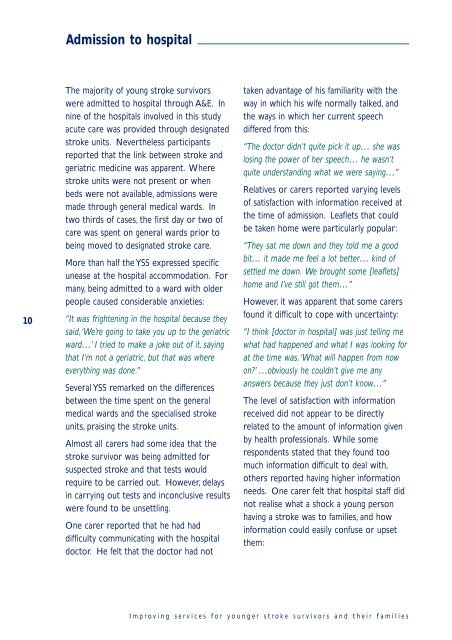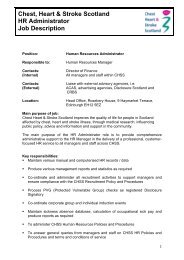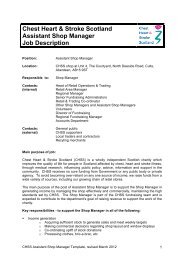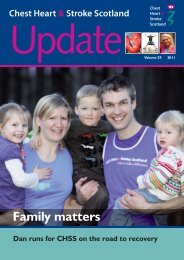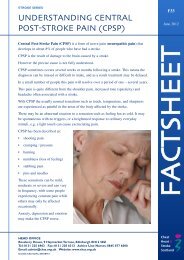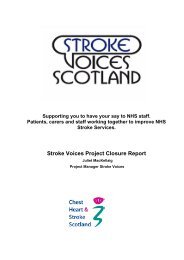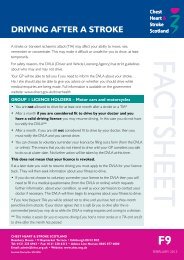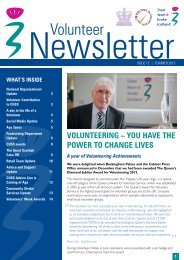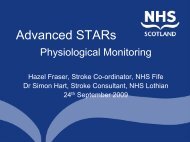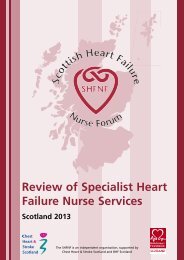Improving services for younger stroke survivors and their families
Improving services for younger stroke survivors and their families
Improving services for younger stroke survivors and their families
- No tags were found...
Create successful ePaper yourself
Turn your PDF publications into a flip-book with our unique Google optimized e-Paper software.
Admission to hospital10The majority of young <strong>stroke</strong> <strong>survivors</strong>were admitted to hospital through A&E. Innine of the hospitals involved in this studyacute care was provided through designated<strong>stroke</strong> units. Nevertheless participantsreported that the link between <strong>stroke</strong> <strong>and</strong>geriatric medicine was apparent. Where<strong>stroke</strong> units were not present or whenbeds were not available, admissions weremade through general medical wards. Intwo thirds of cases, the first day or two ofcare was spent on general wards prior tobeing moved to designated <strong>stroke</strong> care.More than half the YSS expressed specificunease at the hospital accommodation. Formany, being admitted to a ward with olderpeople caused considerable anxieties:“It was frightening in the hospital because theysaid,‘We’re going to take you up to the geriatricward…’ I tried to make a joke out of it, sayingthat I’m not a geriatric, but that was whereeverything was done.”Several YSS remarked on the differencesbetween the time spent on the generalmedical wards <strong>and</strong> the specialised <strong>stroke</strong>units, praising the <strong>stroke</strong> units.Almost all carers had some idea that the<strong>stroke</strong> survivor was being admitted <strong>for</strong>suspected <strong>stroke</strong> <strong>and</strong> that tests wouldrequire to be carried out. However, delaysin carrying out tests <strong>and</strong> inconclusive resultswere found to be unsettling.One carer reported that he had haddifficulty communicating with the hospitaldoctor. He felt that the doctor had nottaken advantage of his familiarity with theway in which his wife normally talked, <strong>and</strong>the ways in which her current speechdiffered from this:“The doctor didn’t quite pick it up… she waslosing the power of her speech… he wasn’tquite underst<strong>and</strong>ing what we were saying…”Relatives or carers reported varying levelsof satisfaction with in<strong>for</strong>mation received atthe time of admission. Leaflets that couldbe taken home were particularly popular:“They sat me down <strong>and</strong> they told me a goodbit… it made me feel a lot better… kind ofsettled me down. We brought some [leaflets]home <strong>and</strong> I’ve still got them…”However, it was apparent that some carersfound it difficult to cope with uncertainty:“I think [doctor in hospital] was just telling mewhat had happened <strong>and</strong> what I was looking <strong>for</strong>at the time was,‘What will happen from nowon?’ …obviously he couldn’t give me anyanswers because they just don’t know…”The level of satisfaction with in<strong>for</strong>mationreceived did not appear to be directlyrelated to the amount of in<strong>for</strong>mation givenby health professionals. While somerespondents stated that they found toomuch in<strong>for</strong>mation difficult to deal with,others reported having higher in<strong>for</strong>mationneeds. One carer felt that hospital staff didnot realise what a shock a young personhaving a <strong>stroke</strong> was to <strong>families</strong>, <strong>and</strong> howin<strong>for</strong>mation could easily confuse or upsetthem:<strong>Improving</strong> <strong>services</strong> <strong>for</strong> <strong>younger</strong> <strong>stroke</strong> <strong>survivors</strong> <strong>and</strong> <strong>their</strong> <strong>families</strong>


